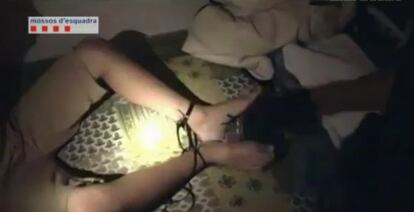“My son is back; it could have been worse,” says mother after drug gang kidnap ordeal
Boy tied up for three nights in Barcelona apartment

“Saturday 29, at 2pm, in Barcelona. Bring the five million.” This is the message Ana María A. heard over the telephone from a woman who was holding her 11-year-old son Kevin hostage. The ransom was meant to cover an alleged debt left behind by her husband, Fabián Guillermo P. G., who is currently in a Valencia prison on charges of drug trafficking.
Fabián was arrested in September 2009 during a raid against a drug network that smuggled cocaine through the port of Valencia inside containers. The Central Drug Brigade found 586 kilograms of the white powder spread over 10 containers, and the police figure that this group may have shipped as much as 1,500 kilograms into Spain. Fabián Guillermo, a Colombian citizen, is accused of being the lieutenant for the Spanish businessman Rafael Rubén Núñez Cercerrados, the alleged head of the drug ring. Both men lived in Sagunto (Valencia), where police say they directed operations to ship cocaine from South America into the peninsula through the Mediterranean city; they also ran a few local businesses as cover. Operation Malinke resulted in 29 arrests, the dismantling of a drug lab in Fuentidueña del Tajo (Madrid) and 40 searches in Madrid, Valencia, Pontevedra, Toledo and Murcia. Officers seized 667 kilos of cocaine, eight firearms, two taser guns, ammunition and 28 vehicles.
Kevin spent three nights and two days with his hands tied inside an apartment on Trajà street, in Barcelona, until the Catalan police managed to find and free him. The child had been so heavily sedated that he spent a week recovering at Sant Joan de Déu.
Ana María, 30, also Colombian, denies that her partner is guilty of anything, until a judge says so. “The arrest was seen on television. It was a big sensation. And later they probably thought, ‘they must be drug traffickers and they must have a lot of money’,” she says over the phone. Yet she insists that they are a normal family. “I run a restaurant, I pay the rent, and I lead a very simple life — I don’t have any luxury cars.”
Both she and Kevin are back in Sagunto. “I’m still scared. I’m very nervous, but I have my son with me — it could have been worse,” she says.
Kevin was taken from her before her very eyes, and there was nothing she could do. “They put a gun to my neck, and told me to be still. I did what they said,” she explains. “I thought they were going to kill me.”
The nightmare began on September 25, when she made an appointment with Marta C. V. at 2pm at a gas station on Plaza Cerdà, in Barcelona. She thought she was going to see a policeman who would allegedly arrange for her and her son to get residency papers without going through official channels. “When I got in the car, she told me that the policeman would see us inside his house because he felt more comfortable there,” Ana María explains. Instead, she and Kevin were taken to an open field in the outskirts, where another car with three men inside pulled up. They were carrying guns. They kidnapped the boy and took all of Ana María’s things. The woman, left completely dazed, walked around until she found a truck driver who agreed to take her back to Barcelona.
The kidnapping took place at 4pm, but Ana María did not go to the police until four hours later, after talking to her husband. The Barcelona police have arrested Kevin’s kidnapper and another individual, both of whom have a police record for theft. They are also looking for a third person involved in the case.
Police sources said that there are very few kidnappings every year in Spain, and that most of those that do occur are related to the settling of scores between members of organized crime gangs.
Tu suscripción se está usando en otro dispositivo
¿Quieres añadir otro usuario a tu suscripción?
Si continúas leyendo en este dispositivo, no se podrá leer en el otro.
FlechaTu suscripción se está usando en otro dispositivo y solo puedes acceder a EL PAÍS desde un dispositivo a la vez.
Si quieres compartir tu cuenta, cambia tu suscripción a la modalidad Premium, así podrás añadir otro usuario. Cada uno accederá con su propia cuenta de email, lo que os permitirá personalizar vuestra experiencia en EL PAÍS.
En el caso de no saber quién está usando tu cuenta, te recomendamos cambiar tu contraseña aquí.
Si decides continuar compartiendo tu cuenta, este mensaje se mostrará en tu dispositivo y en el de la otra persona que está usando tu cuenta de forma indefinida, afectando a tu experiencia de lectura. Puedes consultar aquí los términos y condiciones de la suscripción digital.







































